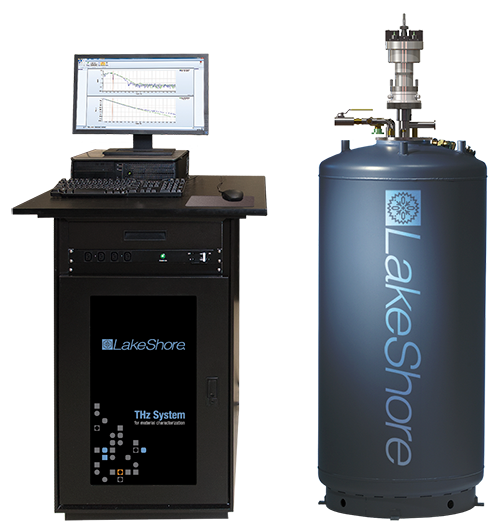
Last month, Lake Shore unveiled its terahertz or THz-based materials characterization system to the American Physical Society (APS) at its 2013 March Meeting. Interest among physics researchers ran high, as attendees discussed the potential for exploration of important electronic and magnetic materials such as high mobility semiconductors, superconducting thin films, organics, and multiferroics. The system’s use of non-contact THz energy to examine samples under high magnetic field and cryogenic temperatures promises new insights into these materials.
APS attendee Chris Haimberger of TOPTICA called terahertz “the wild west of electromagnetics.” Fellow attendees agreed that this area of research held both a lot of promise and misconceptions due to the difficulty in obtaining appropriately robust systems to date.
The launch of this ground-breaking system marks a significant development in materials characterization research. David Daughton, Lake Shore’s principal THz investigator, presented a paper on early measurement results, “High-resolution terahertz spectroscopy of Sr2CrReO6at cryogenic temperatures and high magnetic fields.” Lake Shore also held its own Materials Research Forum at the March Meeting, during which Lake Shore scientists and customers discussed THz technology as well as other novel research areas they are investigating.
The company continued the THz system launch at the Materials Research Society (MRS) Spring Meeting in early April and will also exhibit the technology at the upcoming SPIE DSS conference.
THz Materials Study Underway at Partner Labs
In the last quarter, Lake Shore has also delivered prototype systems to each of their three collaboration partners: The Ohio State University’s Center for Emergent Materials, University of Dayton’s IDCAST facility, and the Air Force Research Laboratory located at Wright-Patterson AFB. These partners are now using the systems to study a range of materials including promising new semiconductors, chemical compounds including amino acids, and epitaxial thin films of ferrimagnetic semiconductors. Recently Lake Shore was selected as a recipient of an Air Force STTR Phase 1 grant for its project, “Terahertz Frequency Materials Testing at Cryogenic Temperatures and in High Magnetic Fields.” Through this program, David Daughton will collaborate with materials scientists at Wright State University and the University of Arizona to develop and validate electronic material parameter extraction protocols for CW-THz spectroscopy in cryogenic and high magnetic field environments.
Media Recognition
In February, Laboratorytalk featured a video and article by Daughton, “The last frontier in materials characterisation,” on its website and in its Materials Characterisation digital publication. The article discusses the promise the THz gap holds for new materials exploration and the insights it has already provided.
Coverage including podcasts and videos from other prominent trade publications are scheduled for release in the coming months.
Training & Support
In March, Lake Shore held training meetings to introduce the new system to its global sales channel, as well as investing in additional software engineering staff to augment the development of systems application software.
Lake Shore continues to investigate possible applications and benefits of employing the THz gap for materials characterization purposes. The company plans to make the system available for sale to the research community in 2014.

